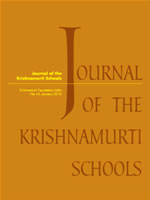Issue 14 - March 2010
- Written by J. Krishnamurti
Questioner: Could you describe how you are aware that you are inattentive?
- Written by Viju Jaithirtha
This is the fourteenth issue of the Journal and what started as an in-house exchange between the various Krishnamurti schools has, over the years, slowly and quietly found a wider audience.
- Written by Radhika Herzberger
Deep Ecology, a current philosophical movement initiated by the Norwegian philosopher Arne Naess in 1972, is shaping the environmental debate by asking fundamental questions about who we are and what human progress means rather than searching merely for technological fixes.
- Written by Javier Gomez Rodriguez
What is education about? In what general context does it find its meaning, its raison d'être?
- Written by Patrick Foster
Discussions of deep philosophical issues may seem out of place in a journal dedicated to K-12 education, but actually philosophical viewpoints (and their assumptions) inform all daily perspectives and behaviors.
- Written by V Rajiv
Most children experience a sharp dichotomy between home and school.
- Written by Shashidhar Jagadeeshan
I am a 17-year-old adolescent male. I am sure this very statement gives you the heebie-jeebies! My parents and teachers are highly educated and have no qualms in sharing all the latest research on adolescents, plus their own home-grown wisdom about teenagers, with me.
- Written by Sharad Jain
As a sports teacher the first thing that struck me, or should I say shocked me, was that sports was not a time that everyone looked forward to.
- Written by Renu Srinivasan
Several years ago my son, then in Class Seven, came home disturbed about an incident in school.
- Written by Usha Aroor
Anita Roddick, founder of the Body Shop which makes personal care cosmetics, was once asked admiringly what special materials her products were made from.
- Written by N. Venu
Everyone agrees that values should be part of a good education.
- Written by The Editors
In the brief articles that follow, we re-examine and unravel the meanings of words commonly used in the field of education.DisciplineWe admire well regulated, ordered lives.
- Written by Meredy Benson Rice
This article describes a new exploration at Oak Grove School, Ojai.
- Written by Padmavathy Sundararajan
It was an unusually pleasant Wednesday afternoon in July.
- Written by K Srinivasan
Science is basically an exploration of that which is not known, or put more flamboyantly, the unknown, in the material world.
- Written by Roopika Jayaram
When I joined Rishi Valley School a little over an year ago, I was introduced to the teachers' resource cupboard, which had files overflowing with reading and reference material for the Social Studies curriculum for Class 6.
- Written by Diba Siddiqi
The social sciences are ideally suited to a learning that draws on immediate and surrounding worlds.
- Written by Willem Zwart
As a teacher I am always looking for a good thesis sentence, for that perfect one-sentence statement that is a concise summary of an article, a film, an argument, a teaching.
- Written by Gopal Krishnamurthy, Michael Lommel, Susan (Sunsong) Clark
Krishnamurti suggested that, 'Education can be transformed only by educating the educator, and not merely creating a new pattern, a new system of action.' Around this challenge, a group of educators participated in a two-week intensive Teaching Academy in the summer of 2009, at Ojai, California.
- Written by Mary Heerin
To educate another, you must re-educate yourself, a strenuous task.This statement is, perhaps, widely understood by most teachers who have been in the classroom for more than a few years.
- Written by Kamala V. Mukunda
This is a readable book on the psychology of child development and learning, written for the context of Indian schools.


